Maybe you haven’t heard of schwas before, or maybe you’ve heard of them but are wondering how to teach schwas to your children. If so—read on! By the end of this post, I hope to have helped you make sense of the schwa.
What Is a Schwa?
The schwa is a muffled vowel sound that is heard in countless English words. Say the following words aloud and listen for the sound of the underlined vowel.

See how the underlined vowel doesn’t say one of its normal sounds? Instead, depending upon the word, it says a muffled /ŭ/ or /ĭ/ sound. Also, do you notice how the schwa appears in an unaccented syllable? That schwa is what makes these words trickier to read and spell.
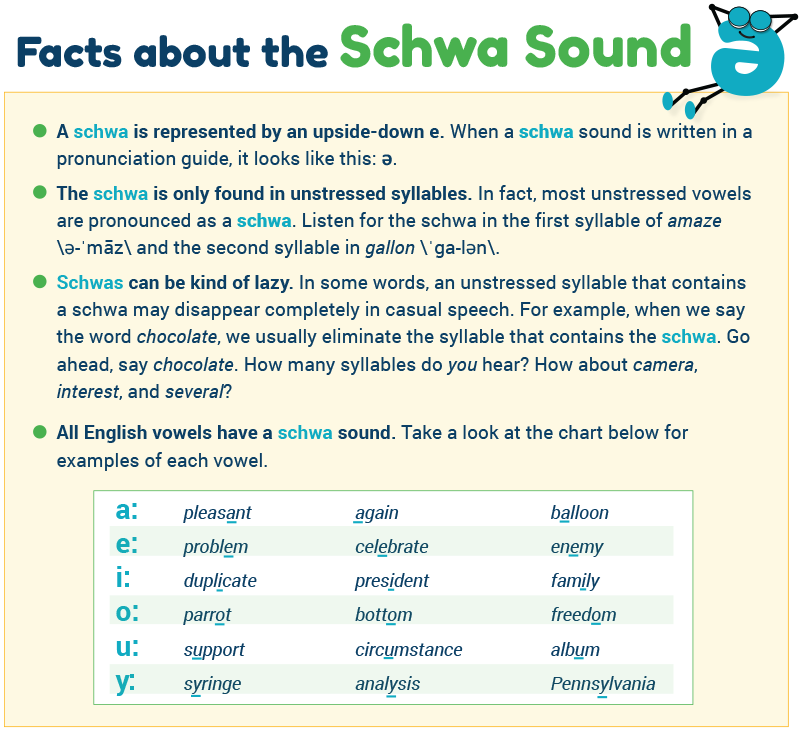
In All About Reading and All About Spelling, we don’t use the term “schwa” with the student. Instead, we teach several strategies to help children deal with words that have muffled vowel sounds in the unaccented syllable. Here are some of my favorite strategies for teaching schwas.

6 Strategies for Teaching Schwas
Teach your child to “pronounce for spelling.”
When learning to spell words that contain schwas, it really helps to “pronounce for spelling.” This is a simple technique in which we “over-pronounce” all the syllables, allowing us to clearly hear the vowel sounds. Take the word cabin, for example. Since the second syllable is unstressed, the letter I takes on the schwa sound, making it unclear which vowel to use for spelling. When we over-pronounce the word as “cab-IN,” it becomes clear that the letter I is used.
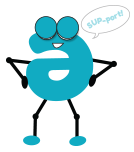
Here is how this works in practice:
1. “Spell the word support. I’ll pronounce it for spelling: SUP-port.”
2. The student repeats the word, pronouncing for spelling.
3. The student spells the word, and then reads the word normally: “support.”
Use All About Spelling Word Banks to build visual memory.
Have your student read through the Word Banks to become familiar with seeing the correct spelling. Then, when your student hears a muffled vowel sound and isn’t sure how it should be spelled, she can try “scratch paper spelling” to help determine the correct spelling.
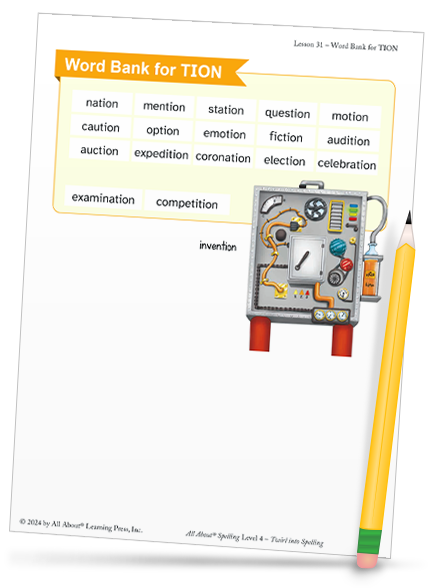
Encourage your child to think of related words.
If a child can’t remember how to spell the word definition (def-uh-ni-tion), he can think of the root word (define) and use it as a clue for choosing the vowel that is making the /uh/ sound in the word.
When reading, be prepared to “say it like a word.”
If you read the word button with a short o sound in the second syllable, as in /bŭt-tŏn/, you’ll sound like a robot and listeners may have a hard time understanding you. Since there is a schwa in the second syllable, we have to be prepared to make slight adjustments in order to “say it like a word.”
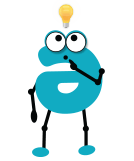
Here’s how to lead your student through the “say it like a word” activity:
1. Choose a word that is in your child’s oral vocabulary, such as the word problem.
2. Say the word as if you were a robot, without using the schwa sound: /prŏb—lĕm/.
3. Have your child “say it like a word” by repeating the word in normal speech.
Once your child is proficient at repeating the words using the schwa sound, you can remind him to use this activity as he reads to help decode unfamiliar words. Soon you’ll be able to remind your student to “say it like a word” and he’ll correct himself.
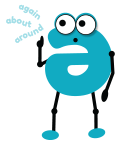
- Teach words of similar construction at the same time so your child can see the pattern.
For example, the letter A commonly takes on the schwa sound at the beginning of words like about, around, again, and so on. These words are taught together so that children will easily master this pattern.
- Remember to review.
Students may need quite a bit of review with words containing the schwa, especially when it comes to spelling. Be sure not to skimp on review time, and have patience with the process. With practice and these strategies, your child can make sense of the schwa!
Has the schwa sound caused problems for your child? Which of these techniques do you think will be most helpful?




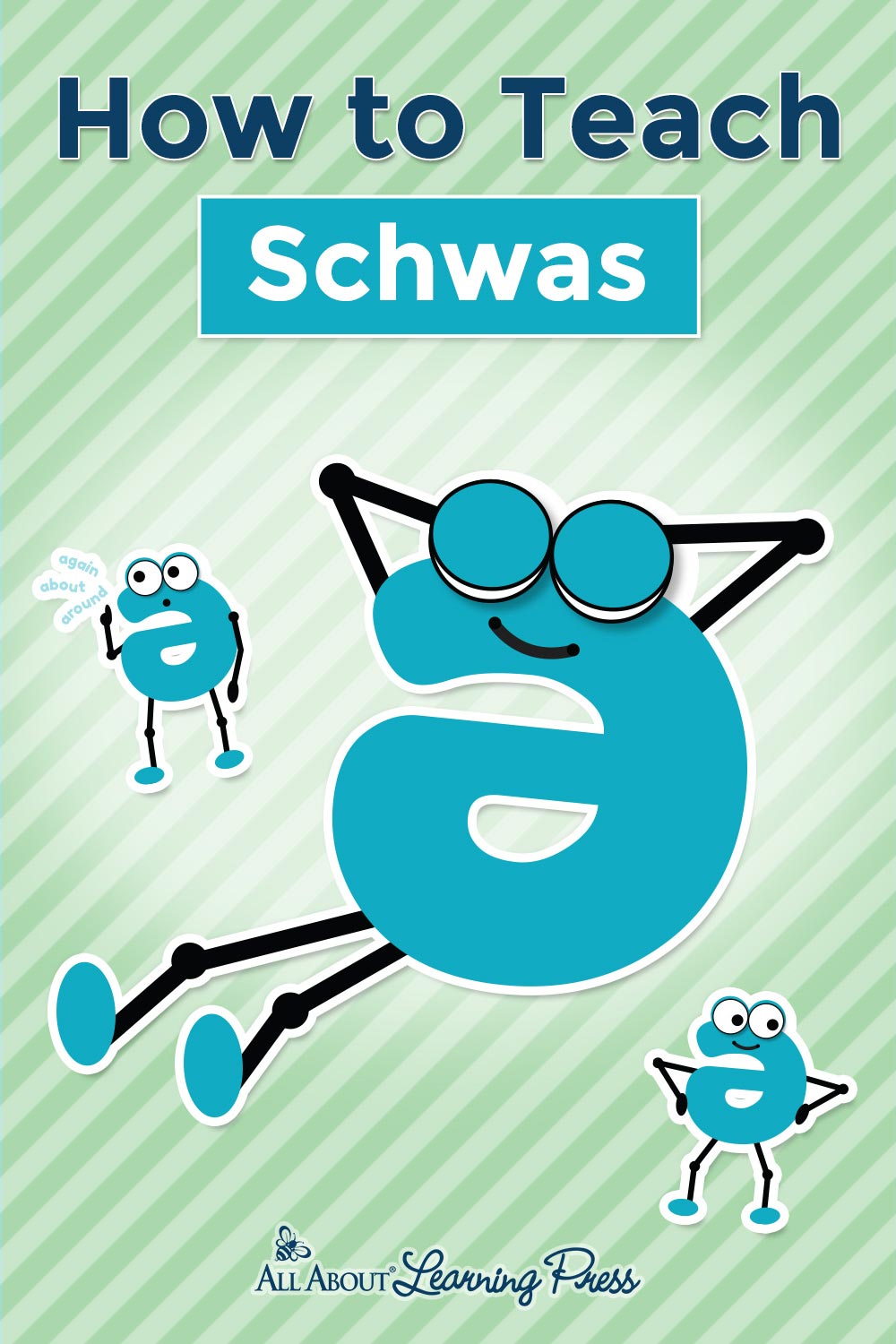







martha valdespino
says:please send me any information
My son struggles with spelling and all the English rulles
Robin
says: Customer ServiceMartha,
I’m sorry your son is struggling with spelling. Here are some helpful articles:
How to Teach Phonograms
Segmenting: A Critical Skill for Spelling
Articles on Spelling Rules
A Handy Guide to Short Vowel Sounds
A Handy Guide to Long Vowel Sounds
10 Tips for Reaching Your Struggling Learner
I hope these helps, but please let me know what specific questions you have.
Mary
says:Why is a shwa not considered one of the syllable types? What type of syllable is “a” in about? Or “le” in celebrate?
Robin
says: Customer ServiceGreat question, Mary!
Schwa is not considered a syllable type because almost any syllable type can include the schwa sound.
The first syllable of about could be either open (a-bout) or closed (ab-out). I’m inclined to go with it being a closed syllable because the short A ab-out is closer to the typical pronunciation.
The middle syllable in celebration is a closed syllable (cel-eb-ra-tion).
The name game (vowel-consonant-E) syllable type can have the schwa sound as well. For example, the last syllables in suggestive, necklace, and climate.
Vowel team syllable types can have the schwa sound: captain, restaurant, serious.
Bossy R syllable types can say schwa: thermometer, temporary, and literary.
Cath V
says:A very excellent post, thank you. I’ve often “over-pronounced” words like ‘cabin’ and ‘dragon,’ to help my students (one-on-one tutoring) spell these difficult vowel sounds, and now I can use the phrases “pronounce for spelling” and “say it like a word to help them with both spelling and pronunciation skills. Great verbal aids for spelling techniques.
Robin
says: Customer ServiceSo glad these will be helpful for your students, Cath!
Lena
says:Thank you for all you teach!I’m from Russia.And what about the constructionThere is There are ( for children)
Robin
says: Customer ServiceLena,
I’m not sure what you are asking regarding “There are” and “There is.” I’m happy to try to answer your question, but I will need more information.
Sally Chancellor
says:Pronounce for spelling has been a very helpful strategy for us.
Robin
says: Customer ServiceSally,
Yes! The “Pronounce for Spelling” Technique is very helpful for many students.
Tonia Stahl
says:Fascinating! I had never heard the schwa term before, explains alot!
Robin
says: Customer ServiceI’m glad this explains things, Tonia!
Heather
says:I diffenitly don’t get it. Didn’t get passed the first paragraph since I pronounce the words possible diffenitly then others so the letter is not muffled. I also never say z for s ever.
Robin
says: Customer ServiceHeather,
How do you pronounce words like is, his, rose, and easy? In each of these, the S is pronounced with the /s/ sound. I’m fairly sure this is standard across regional accents as well.
Anja
says:Hi, Robin!
Isn’t in each of these (is, his, rose and easy) the S pronounced with the /z/ sound?
Thanks, Anja
Robin
says: Customer ServiceYou are so right, Anja! I meant to say these words have the /z/ sound of S. I put /s/ when I meant /z/. Sorry for the error.
Tracey
says:Very good information, thank you!
Toya
says:It can be a tough concept to teach, thank you for this resource.
Robin
says: Customer ServiceYou’re welcome, Toya.
Robin
says: Customer ServiceYou’re welcome, Tracey!
Casie
says:This is helpful!
Robin
says: Customer ServiceGlad it’s helpful, Casie!
Constance
says:Thank you for this! This will be a big help for some of my spellers who struggle with these “lazy” vowels!
Robin
says: Customer ServiceConstance,
You’re welcome. Those lazy vowels are tricky!
Shawn
says:This was very helpful! I wasn’t even taught this in school!
Robin
says: Customer ServiceI know what you mean, Shawn. And it’s not just English either. Apparently a number of languages have schwas.
Oana
says:Very helpful, thank you
Robin
says: Customer ServiceGlad this is helpful, Oana.
Brittany
says:Very helpful! Thank you!
Robin
says: Customer ServiceGlad this was helpful, Brittany. You’re welcome.
Heather
says:Such good information! Glad I saw this post!
Sarah
says:Yes this is definitely more of an issue in spelling than reading. I like the over pronunciation method and the scratch spelling method. I will have to try these.
Robin
says: Customer ServiceSarah,
I hope you find these helpful. The schwa sound can be tricky!
Samantha H
says:I cannot say enough good things about this program, and it is one that I recommend wholeheartedly to anyone who is looking to homeschool and needs a curriculum. My daughter is grades above with her spelling and reading, and my soon to be 1st grader is also going to start these books to enhance her reading and spelling.
Robin
says: Customer ServiceThank you, Samantha! It’s wonderful to hear how great your children are doing!
Erin K. D.
says:I’m glad I found this post. I have been wondering why AAS doesn’t consider /uh/ as a “4th” sound of a, since it sounds like that in a lot of words, like about, above, etc. This explains that it’s a schwa sound, but I still don’t understand why this schwa isn’t also seen as A’s 4th sound. I thought it would be similar to /uh/ being given as the 4th sound of O. Anyone have a simple answer for me? Thanks! (I’ve only gotten midway through level 3 so far, in case it is explained further in a level I haven’t gotten to yet lol)
Erin K. D.
says:I’m glad I found this post. I have been wondering why AAS doesn’t consider /uh/ as a “4th” sound of a, since it sounds like that in a lot of words, like about, above, etc. This explains that it’s a schwa sound, but I still don’t understand why this schwa isn’t also seen as A’s 4th sound. I thought it would be similar to /uh/ being given as the 4th sound of O. Anyone have a simple answer for me? Thanks! (I’ve only gotten midway through level 3 so far, in case it is explained further in a level I haven’t gotten to yet lol)
PS: Is my pronunciation like “shwa” correct?
Robin
says: Customer ServiceGreat question, Erin!
We include the short U /ŭ/ sound for O because O can make that sound in accented syllables, such as love and oven. In these words, it is not the schwa sound, it is the actual sound that O is making in those words.
A, however, makes the /uh/ sound only in unaccented syllables. The sound of A in words like above should be long A (open syllable), but it becomes the muffled /uh/ schwa sound. Since all vowels can make the schwa sound in unaccented syllables, we would have had to add it to all vowels and even vowel teams. That would be confusing for students, so we teach about how vowel sounds can get muffled when syllables are not accented.
The sound of A in unaccented syllables is taught in Level 4 of both All About Reading (Lesson 11) and All About Spelling (Step 20).
Schwa is pronounced like /sh/-/w/-/aw/. Here is a link to hear it.
I hope this clears things up for you, but let me know if you have additional questions.
Jodi
says:I always get great ideas for my ESL students from AAR and AAS!
Robin
says: Customer ServiceGreat to hear, Jodi! Glad to know All About Learning Press resources are helpful for your students! Thank you.
Lyndsey
says:I love how AAR always has wonderful techniques to help struggling readers that actually work! Thank you for this curriculum!
Robin
says: Customer ServiceIt’s great to hear that All About Reading is helping, Lyndsey!
Megan
says:Great information, thank you!
Robin
says: Customer ServiceYou’re welcome, Megan. Thank you!
Katie Cole
says:Amazing information! Thank you!
Robin
says: Customer ServiceYou’re welcome, Katie!
Victoria
says:I am new to teaching reading so this is a great resource. Thank you!
Robin
says: Customer ServiceI’m glad our blog resources are helpful for you, Victoria! You’re welcome.
Kesiah
says:Absolutely love the all about reading programme. The progress is amazing to see in my children and I’m even learning new things.
Robin
says: Customer ServiceIt’s great to hear that your children are progressing, Kesiah!
Marisa
says:Learned something new!
Brittany
says:I was never taught this! I have learned something new!
Robin
says: Customer ServiceGlad to help you learn something new, Brittany!
Priscilla
says:I’ve never heard the term schwas. Super interesting!
Brittany
says:I learned something new on this blog post! I didn’t know before what a schwa was.
Elizabeth John
says:These tips are so helpful. We use the “pronounce for spelling” A LOT. My son is in Level 2 of AAR and AAS – I am taken aback by how many schwas we encounter in basic, every-day words! It makes it a little challenging when he is trying to spell a word and repeating it on his own. We change so many vowels in our pronunciation!! Thankful for the great teaching methods used in AAR and AAS. A proud homeschooling moment the other day was when he made a thank-you card for someone and labeled a drawing “doll”. He stopped and said doll and clapped that it was single syllable, then confidently told me “that means I have to double the l at the end.” Love it!
Robin
says: Customer ServiceElizabeth,
I love that your son is thinking about the rules and applying them. Great work!
Elizabeth M
says:I don’t think this was ever covered when I was learning to read. So fascinating.
Wendi
says:Never knew what this was called. My daughter was just asking about this sound/exception a few weeks ago.